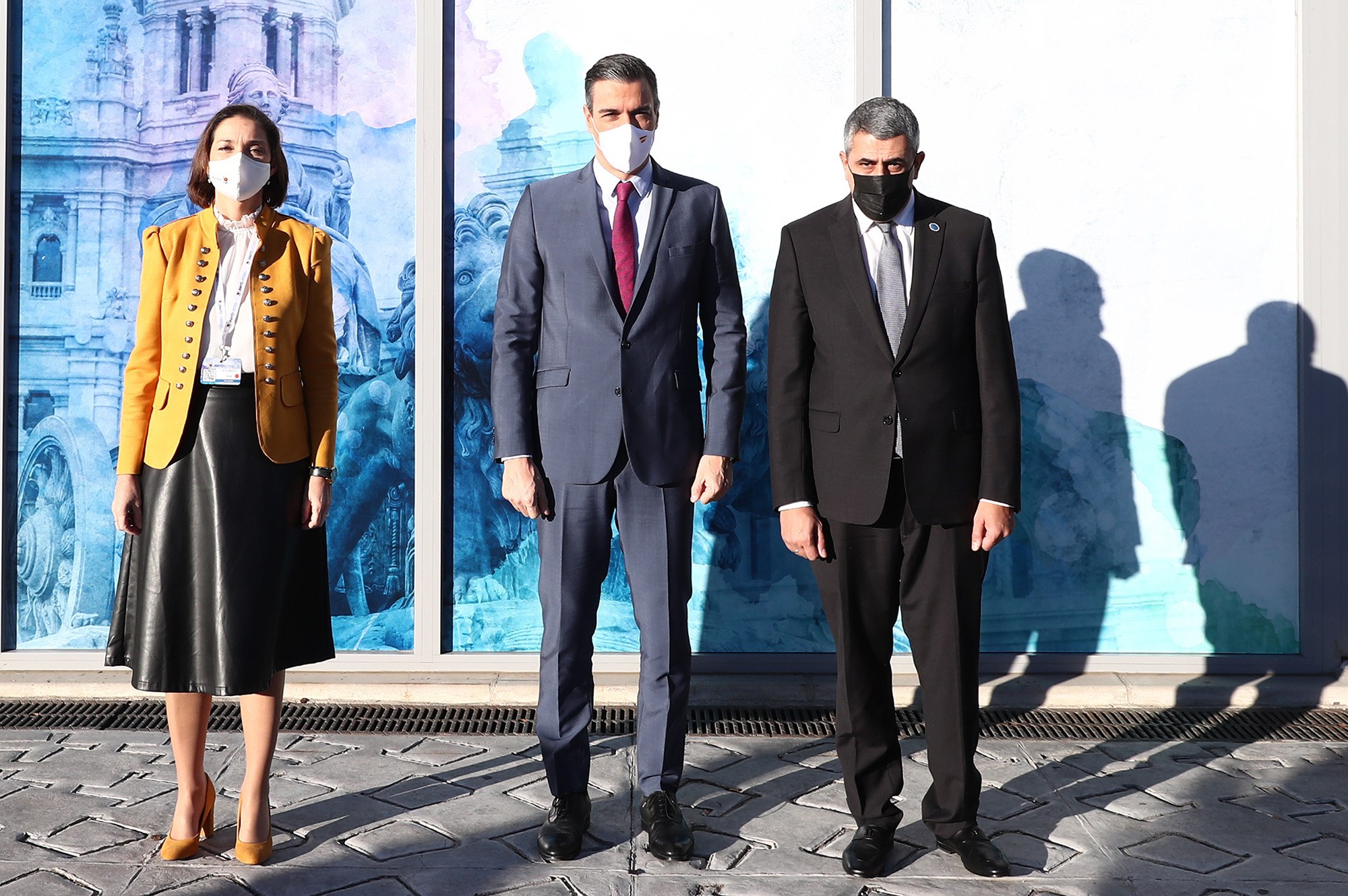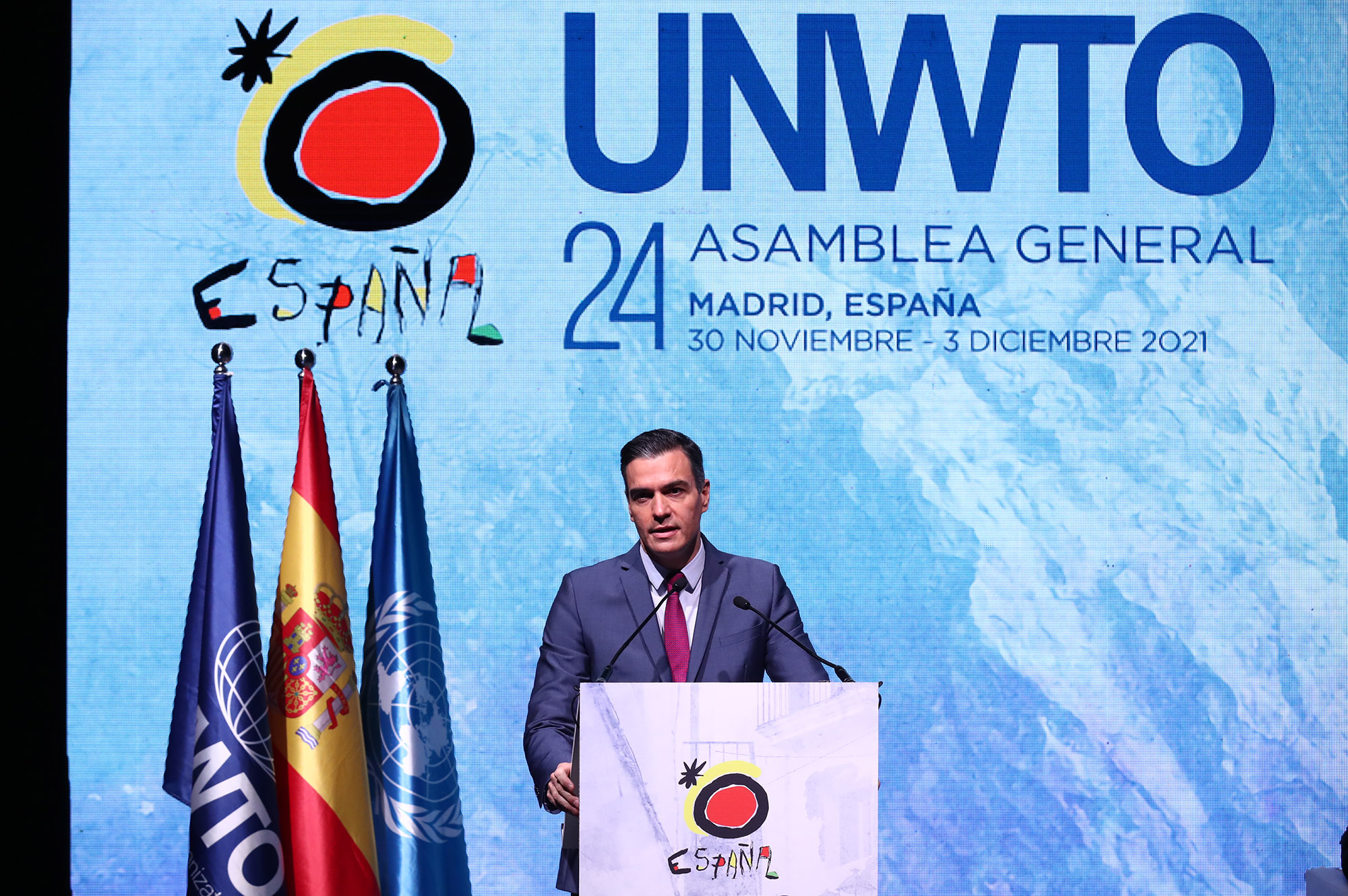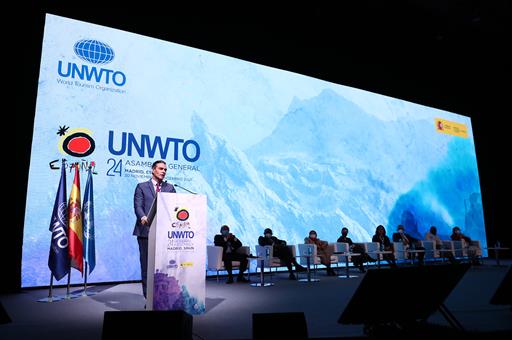The President of the Government of Spain participates in the 24th General Assembly of the World Tourism Organization in Madrid
Pedro Sánchez reinforces confidence in Spain's economic recovery, with growing momentum and job creation
President's News - 2021.12.2
Marriott Auditorium, Madrid
The Assembly is the highest deliberative and decision-making body of the organisation. It meets every two years and it being held in Madrid underlines Spain's maximum commitment to the only United Nations organisation with permanent head office in our country, for which Spain has ceded the Palacio de Congresos building on the Paseo de la Castellana to the UNWTO.
During his speech, Pedro Sánchez praised Spain's organisation of this event as an example of "maximum cooperation and unity" between countries, with a capacity for constant adaptation in the face of the evolution and uncertainty that the global pandemic has been causing for almost two years now.
For the president, Spain did not hesitate for a moment in offering Madrid as an alternative venue "because of our proven capacity" in organising international events, but, fundamentally, it did so "to reinforce a clear message: the global recovery agenda cannot stop", with our country in "a period of full growth" and an "ever-increasing" momentum as the year progresses.
"Today Spain is growing, creating jobs and is in full economic recovery", said the president of the Government of Spain. This has been the best November for employment in the whole historical series, 74,381 fewer unemployed people than in October and 61,768 more affiliated with the Social Security, which means the highest number of affiliates in its history, more than 19.7 million. In addition, youth unemployment has fallen by 33% in the last year.
Pedro Sánchez highlighted the fact that these employment and affiliation figures have been achieved in a year and a half and are above pre-pandemic levels, "whereas in the previous crisis this process took us more than a decade".
In this sense, Sánchez insisted that "this trend will continue next year, when the Spanish economy will grow by 5.5%", a figure that coincides with the recent OECD forecast and above the forecasts set by the IMF for world growth (4.9%) and the total of advanced economies (4.5%); and by the European Commission for the eurozone (4.3%).
Redefining tourism
 Pool Moncloa / Fernando CalvoThe President of the Government of Spain pointed out that, as tourism is one of the activities most affected by the pandemic, it is this sector where the recovery agenda cannot be "stopped or slowed down", but must be 100% fulfilled, because tourism is not just an essential economic engine. "It also represents a way of knowledge that unites us, that allows us to know each other better and makes us more human, contributing to the progress of our societies".
Pool Moncloa / Fernando CalvoThe President of the Government of Spain pointed out that, as tourism is one of the activities most affected by the pandemic, it is this sector where the recovery agenda cannot be "stopped or slowed down", but must be 100% fulfilled, because tourism is not just an essential economic engine. "It also represents a way of knowledge that unites us, that allows us to know each other better and makes us more human, contributing to the progress of our societies".
Against this backdrop, Pedro Sánchez has singled out the Assembly as the "ideal setting" to undertake the task of "redefining" the route to be built by the tourism industry after almost two years of the global health emergency. To do so by focusing on four basic actions: "safe mobility, global vaccination, multilateral unity of action and a sustainable tourism model".
Despite all the difficulties, "the world has learned in just a few months to put in place systems that ensure the safe mobility of people", with proven successful tools, such as the OECD's Safe International Mobility Initiative or the digital COVID Certificate within the EU. Both instruments were proposed and promoted by Spain from the outset, and today they are used as benchmarks in the world for having generated "confidence and certainty", also adapting "to the health situation of each territory and each individual".
For Sanchez, regaining that mobility depends solely on global vaccination against COVID. "I am proud to represent a country whose society has understood the importance of vaccines in an exemplary manner. The President therefore reiterated an appeal to the international community: "There is no alternative to true universal vaccination. Our safety and our recovery depend on it.
With 90% of its population over the age of 12 already fully vaccinated, Spain "is going to continue" to reinforce this protection "in the coming weeks and months, and we have high hopes of soon adding a Spanish vaccine" to all those available.
The President of the Government of Spain stressed that this universal vaccination will not be possible without solidarity. "The news these days is a stark reminder that the world will not be safe until vaccines are everywhere. Spain is committed to this task. First, by fulfilling the commitment to donate 30 million vaccines this year and to reach 50 million by the first quarter of 2022, through the COVAX mechanism. And second, "sharing knowledge by releasing a patent on a virus detection test", available to countries with less advanced economies.
All these actions, Sánchez said, would not be possible "without unity of action" among nations. Therefore, "we must defend multilateralism", which has been "a key instrument to effectively manage the terrible threat of the pandemic and its consequences".
Isolationism, mistrust or competitive confrontation "would be the worst recipes to face the demanding future that awaits us". Faced with phenomena such as pandemics or climate change, "undoubtedly the great challenge of our century", there is only one way out: "shared solutions". For this reason, the President took the opportunity to, "on behalf of Spain", thank the multilateral work carried out during the pandemic by entities such as the WTO, the World Health Organization and the United Nations.
Spain's commitment Pool Moncloa / Fernando Calvo
Pool Moncloa / Fernando Calvo
For Pedro Sánchez, the recovery of tourism is "fundamental to our economies and an absolute priority for Spain". Until 2019, Spain was the most competitive tourist destination in the world and the second world power in the industry, both in terms of visitor numbers and revenues.
Sánchez said that, while during the worst moments of the pandemic "we mobilised a huge amount of resources in order to protect businesses and jobs, now our efforts are focused not only on reactivating the sector, but also on modernising it, in order to maintain our leading position. We have to implement measures for a sustainable tourism model, which protects natural and heritage resources.
Spain's commitment consists of a rapid, resilient, inclusive and sustainable recovery of the tourism sector, "which takes advantage of this period of change to move towards a new development model" and turns Spain into a hub of innovation in the digitalisation of the industry, which expresses "the ambition and interest" of our country in "serving as a benchmark" for other nations "to undertake together the transformation of world tourism".
This is the sustainability framework for the tourism industry in Spain, which frames the current policies promoted by the Government, such as the Modernisation and Competitiveness Plan - with 3.4 billion euros financed with European NextGenerationEU funds -, and will accelerate the sector's transition towards a CO2 emission-free activity, energy efficiency and circular economy in companies and destinations.
The Plan will also finance the digital transformation of the sector and its businesses, with the creation of a Smart Destination Platform. It will also make it possible to achieve a better territorial rebalancing by providing new economic resources to depopulated inland areas, thus enabling their population to settle. Likewise, through the programme of Social Sustainability Plans for the Tourism Sector, a fairer distribution of the benefits of tourism for companies and workers is promoted, which protects work-life balance and prioritises gender equality.
Non official translation





